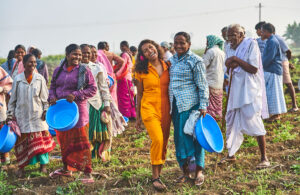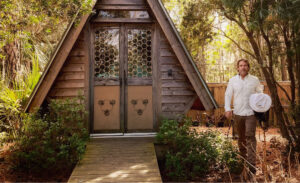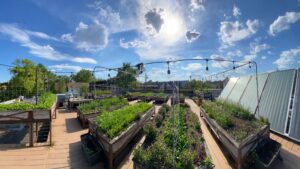
Diaspora Co – Building a Better, Equitable Spice Trade
Creating an equitable spice trade by disrupting an outdated trade system and putting money and power into the hands of Indian farmers.
Uganda, Africa
Jonathan Lefebvre April 4, 2023
Jeff Steinberg, the Founder & Managing Director of Latitude Trade Co., produces specialty cacao and craft chocolate at origin in Uganda. The company is a certified B Corp that focuses on economic and environmental impact and development-based outcomes. The company works directly with farmers, regularly visiting 4,600 farms and using over 70 rural collection points to ensure a traceable, sustainable supply chain. The company is vertically integrated, meaning that it captures a more significant part of the supply chain under one roof. It currently works directly with thousands of farming households, impacting an estimated 20,000 people.
Steinberg studied economics at Cornell University, focusing on development economics and econometrics, and previously worked as a researcher and impact assessment consultant throughout Africa. Steinberg was inspired to start a sustainable chocolate company in Uganda after seeing the negative impact that large agricultural trading and processing companies have on rural households in Africa. He decided that this was the best way for him to make the most of his skill set and have the greatest positive impact.
The mission at Latitude remains the same since its founding in 2016—put more money in the pockets of farmers. Steinberg is excited about the future, striving to reach more households across Uganda with Latitude’s impact-first organic sourcing program.
Mood of Living: Where are you from? Where did you grow up?
Jeff Steinberg: I’m from the US, originally Colorado but have moved around throughout my upbringing, also living in New York and Florida.
MoL: Where do you currently live?
JS: Kampala! The beautiful green hilly city in Uganda.
MoL: Where did you go to university, and what did you study?
JS: I went to Cornell University where I studied Economics with a focus on Development Economics and Econometrics.
MoL: How did your previous career influence your decision to create Latitude Trade Co.? What jobs did you have before?
JS: I previously worked as a researcher and an impact assessment consultant for various academic groups, social enterprises, companies and foundations throughout Africa. As a consultant, I was able to see the immense impact that large agricultural trading and processing companies could have on rural households in Africa. I decided this was the best way for me personally to make the best of my skill set for the deepest benefit amongst the greatest number of people.
MoL: What or who inspired you to start a sustainable chocolate company in Uganda? Why Uganda? What was your mission?
JS: I was really interested and inspired by the third-wave coffee movement, particularly how the Rwanda coffee industry was transformed by a few brave actors. I decided the same should be possible in cocoa and we would be the ones to do it for Uganda. While living in Northern Uganda working for a sesame and cotton company, I joked to friends at dinner that I would make the first Ugandan chocolate bar and somehow it became a reality!
MoL: Why and how did you achieve becoming a B-Corp? What are the most important sustainable initiatives you incorporate in your company? How do you ensure a traceable, sustainable supply chain?
JS: This was a very tough process. Anyone who has started the B Corp questionnaire can attest that it is no joke. We’ve always had an economic and environmental impact at the forefront of our minds at Latitude so embarking on this process early in our path as a company really helped force us to think about the difficult questions and allowed us to set standards while we were still nimble and agile. Adopting these standards early and constantly revisiting our weak points to see where we can improve, is really critical in our journey as a social enterprise.
We ensure a traceable sustainable supply chain by working directly with farmers, face to face. In addition to our annual training program, our Latitude field team regularly visits all 4,600 farms to inspect the conditions and troubleshoot with farmers 1v1. When it comes time to purchase the cacao, the company has over 70 rural collection points in the villages operating on scheduled days. Farmers harvest their “fresh” cacao in the morning on coordinated harvest days and bring this cacao on foot to their nearest LTC Collection point. Our team only buys from farmers who are registered in our organic system, and they only buy cacao which was harvested the same morning. At the collection point, we weigh using certified calibrated weighing scales and pay the farmer cash on delivery with a receipt for their own records. Each individual delivery by each farmer is sealed with a tamper-proof seal and tagged so that it can be traced all the way from the collection point, through fermentation and into the warehouse.
MoL: Can you explain what a vertically integrated social enterprise means? How does this positively impact farmers and communities? How many people’s lives do you impact?
JS: A social enterprise to us means that our outcomes and indicators of success are not only financial but also development based. Vertical integration is the idea of capturing a greater part of the supply chain under one roof. The role that Latitude plays in our cocoa and chocolate supply chain is traditionally done by 5-10 different companies and actors in other cocoa and chocolate supply chains. Currently, we are working directly with over 4,500 farming households, amounting to an estimated 20,000 people.
MoL: Can you explain the process of creating your chocolate from bean-to-bar? Where is your chocolate made?
JS: All of our chocolate is made from bean-to-bar in Uganda at our factories and processing facilities. Cocoa is grown throughout the country. When farmers harvest, they deliver to the nearest Latitude collection point where they are paid for their produce. The cacao is then aggregated at our central fermentation and drying centers for a period of 20 days of processing. Once this is complete, the cacao gets sent to Kampala to be roasted, winnowed, refined, and molded into chocolate bars which normally takes a period of 2-3 days.
MoL: What have you learned from starting your own business? Do you have any advice for people who want to create a sustainable food company?
JS: So much! It is all about the people, your willingness to fail, and your ability to learn efficiently. It takes a lot of hard work and time to build a brand, so my advice is to make sure the people you’re working with understand this and buy into the vision for the long run. The world of tech entrepreneurship has caused us to grow accustomed so businesses reaching scale and success very quickly and it’s important to remember that this is simply not very common or easy to do in more traditional industries like FMCG manufacturing.
MoL: What were some difficulties you encountered when you started the company? What are some challenges now?
JS: It was really challenging to be a solo entrepreneur in a foreign country with minimal knowledge of both the product and the culture. As much as I had been living and working in the region for 4 years by that time, it is quite a different experience being a consultant in a company and on a big team of knowledgeable people compared to learning how to motivate, manage and lead people in your own company from such vastly different backgrounds, both personally and professionally.
Now, many of the challenges we face are around how we grow. There are so many opportunities and possibilities that our main concerns are about 1) How do we continue to innovate and stay relevant? 2) How do we choose where to focus our energy to generate the most impact for our partners and return for our investors?
MoL: How can people get involved with a purpose-driven company like yours?
JS: The best thing you can do is buy more sustainable chocolate or visit us at the origin!
Our own Latitude chocolate bars are sold online in the US, EU, UK and Japan. Excellent chocolate produced using our sustainable and transparently sourced Semuliki cacao is also made by amazing chocolate companies like Raaka, Manoa, Ritual, K’UL, Zotter, the Swedish Cacao Company, and many others. If you buy a chocolate bar with Semuliki on the label, you’re supporting Latitude!
We also offer all-inclusive origin tours for groups between 6 to 16 people combining the National Parks of Uganda with opportunities to experience local culture and learn about cacao, chocolate, coffee and other important value chains. Contact us at tours@latitudetrade.co for more info.
Purchase Latitude Chocolate in the US HERE.
MoL: What are some future goals for Latitude Trade Co.? Has your original mission evolved/changed?
JS: Our mission remains true: more money in the pockets of more farmers! Our aim is to reach 20,000 households across Uganda with Latitude’s impact-first organic sourcing program within the next 5 years and continue to make tasty chocolate treats here in Uganda.
Follow along! @latitudechocolate_kla
Photography courtesy of Latitude Trade Co.

Creating an equitable spice trade by disrupting an outdated trade system and putting money and power into the hands of Indian farmers.

Helping to save the bees by building hives, pollinating flowers, powering food supply, and spreading beauty.

Founded by Helen and Mike Cameron, Uncommon Ground is America’s first certified organic rooftop farm.